外研版九年级英语下册课件Module 3 Life now and then Unit 1 (共35张PPT)
文档属性
| 名称 | 外研版九年级英语下册课件Module 3 Life now and then Unit 1 (共35张PPT) |
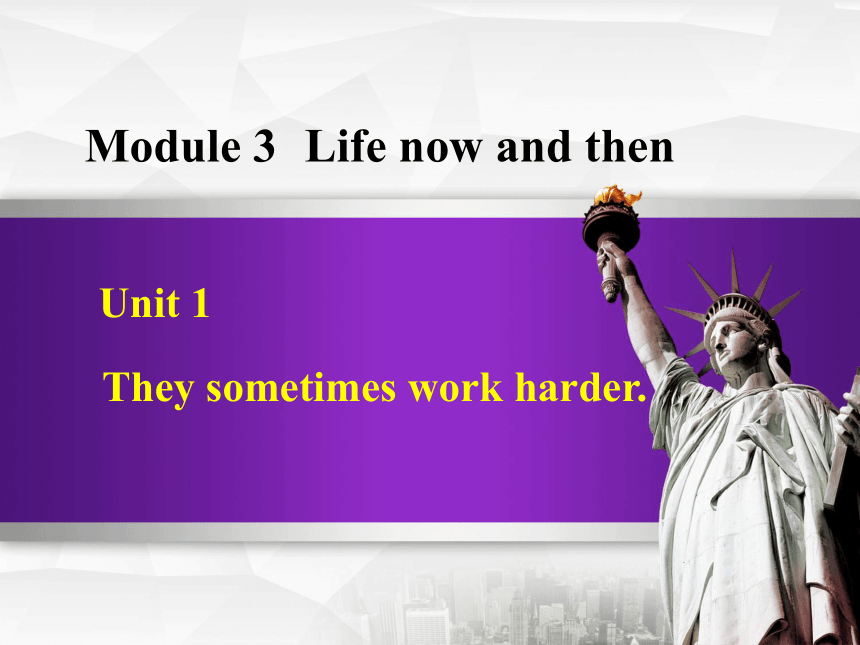
|
|
| 格式 | ppt | ||
| 文件大小 | 3.1MB | ||
| 资源类型 | 教案 | ||
| 版本资源 | 外研版 | ||
| 科目 | 英语 | ||
| 更新时间 | 2022-08-16 18:19:35 | ||
图片预览

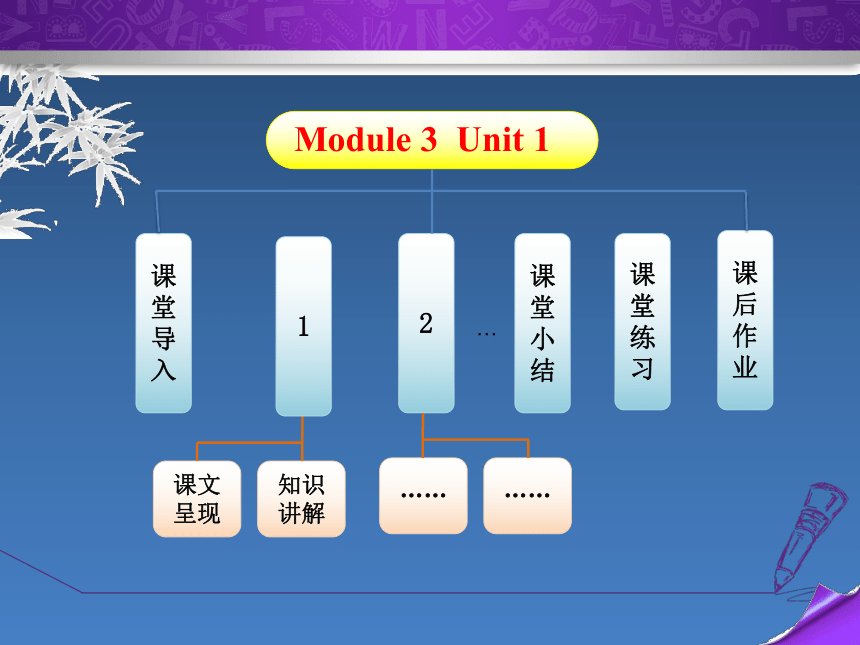

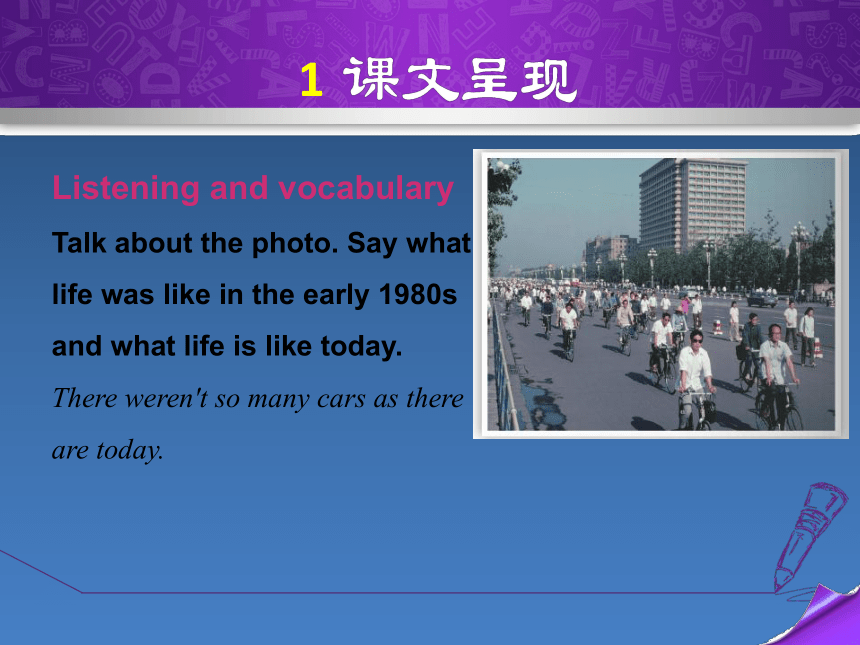
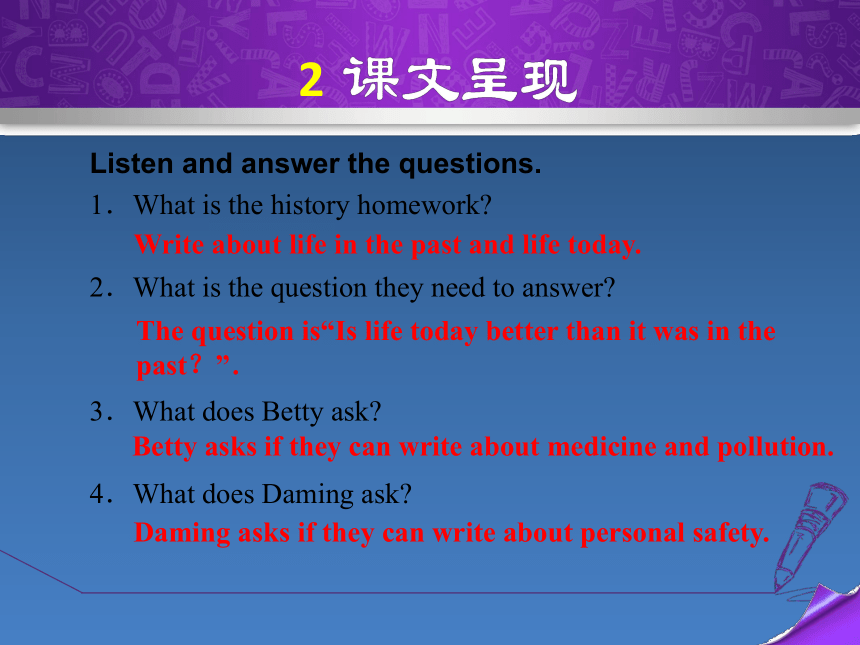
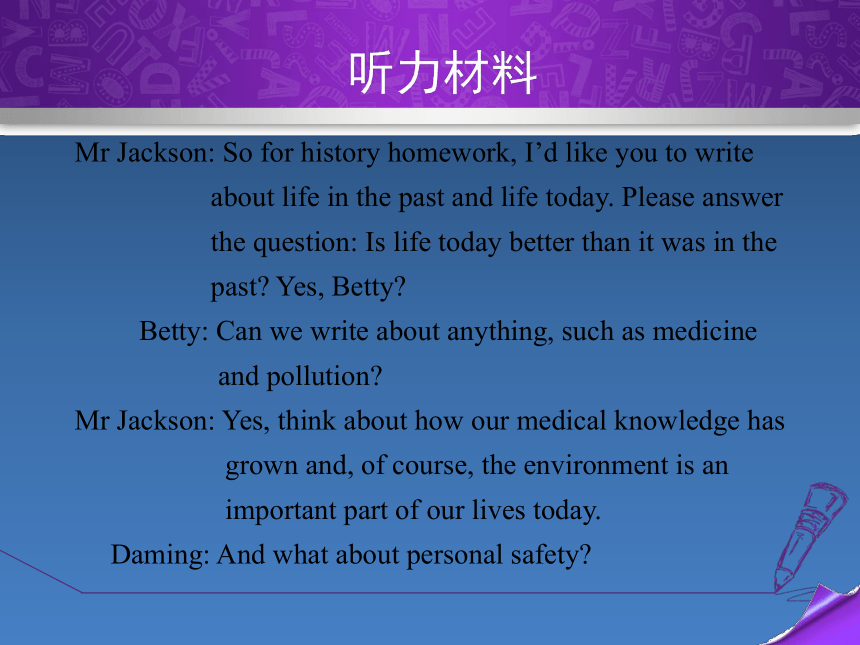
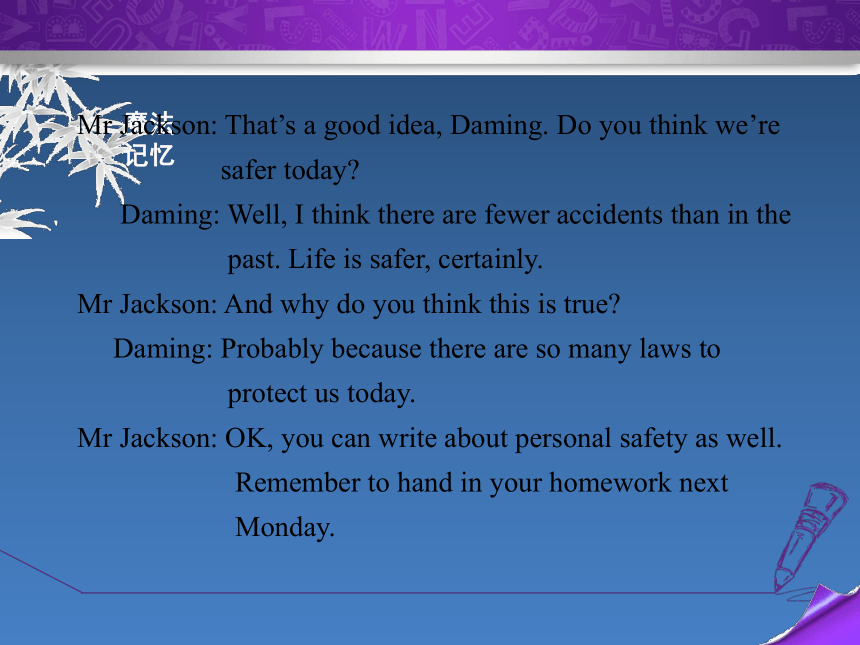
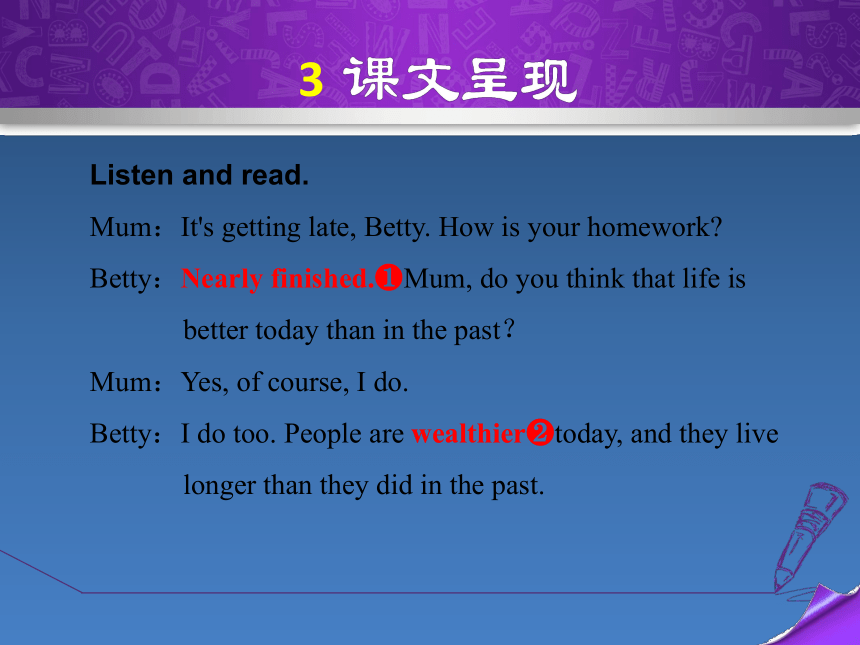
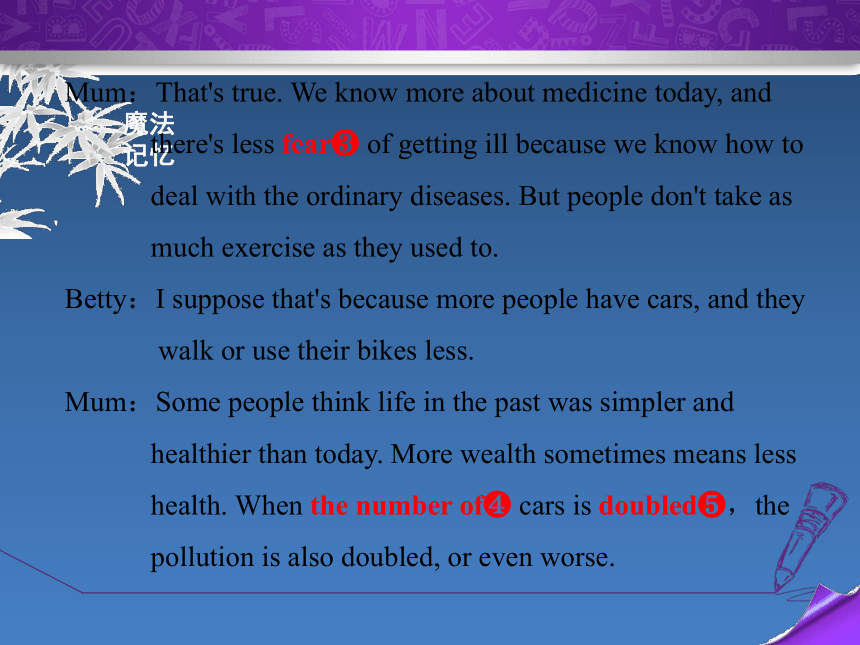
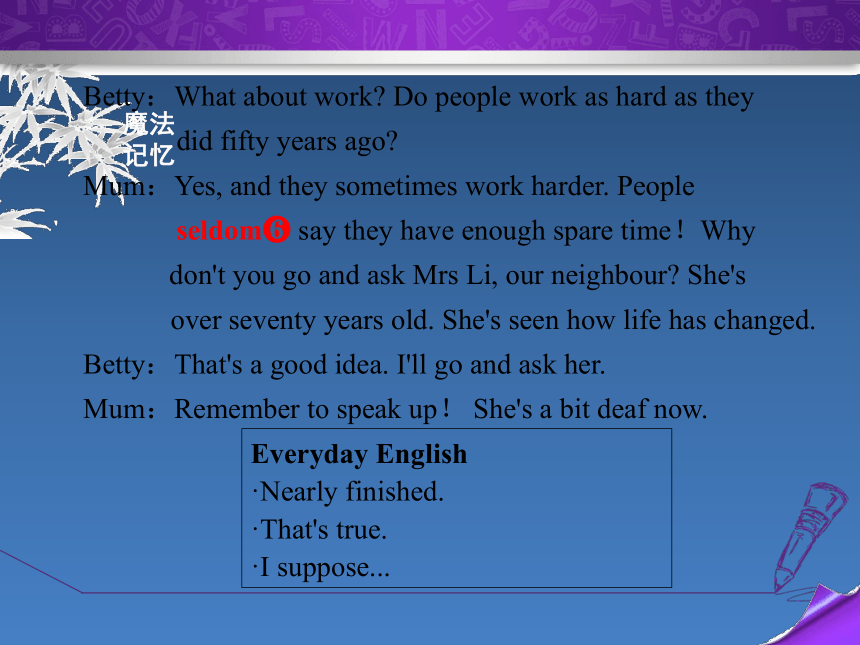
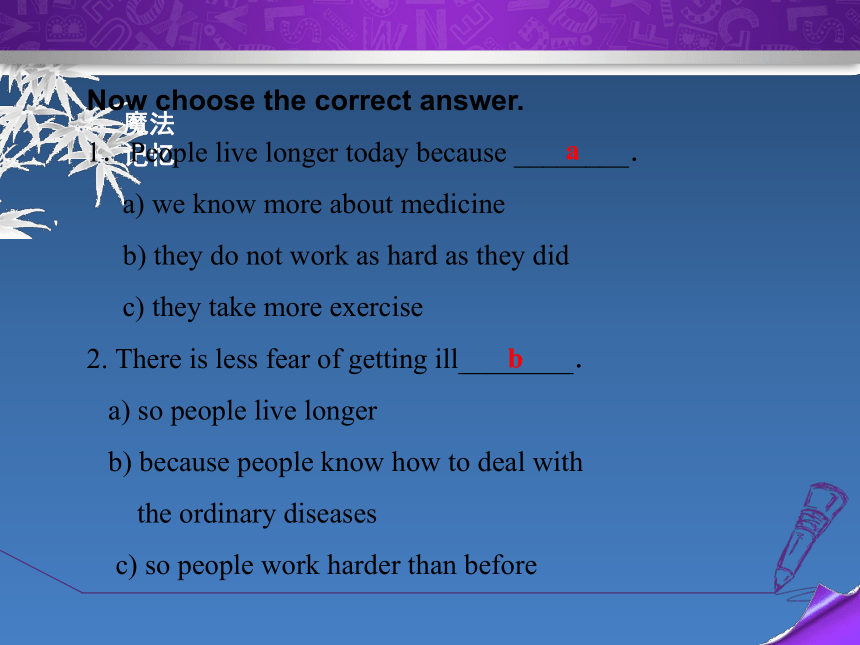
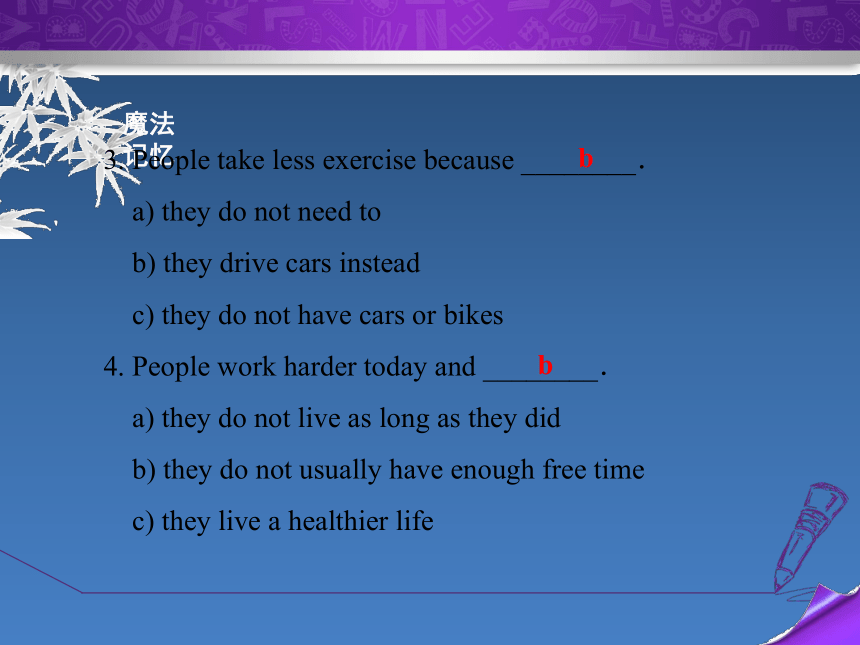
文档简介
(共35张PPT)
Unit 1
Life now and then
Module 3
They sometimes work harder.
课文呈现
知识讲解
……
……
Module 3 Unit 1
课堂导入
1
2
课堂小结
课堂练习
课后作业
…
Look at the pictures below;what can you see
Houses
in the early 1980s
Now
1
Listening and vocabulary
Talk about the photo. Say what life was like in the early 1980s and what life is like today.
There weren't so many cars as there are today.
2
Listen and answer the questions.
1.What is the history homework
2.What is the question they need to answer
3.What does Betty ask
4.What does Daming ask
Write about life in the past and life today.
The question is“Is life today better than it was in the past?”.
Betty asks if they can write about medicine and pollution.
Daming asks if they can write about personal safety.
Mr Jackson: So for history homework, I’d like you to write
about life in the past and life today. Please answer
the question: Is life today better than it was in the
past Yes, Betty
Betty: Can we write about anything, such as medicine
and pollution
Mr Jackson: Yes, think about how our medical knowledge has
grown and, of course, the environment is an
important part of our lives today.
Daming: And what about personal safety
魔法记忆
Mr Jackson: That’s a good idea, Daming. Do you think we’re
safer today
Daming: Well, I think there are fewer accidents than in the
past. Life is safer, certainly.
Mr Jackson: And why do you think this is true
Daming: Probably because there are so many laws to
protect us today.
Mr Jackson: OK, you can write about personal safety as well.
Remember to hand in your homework next
Monday.
3
Listen and read.
Mum:It's getting late, Betty. How is your homework
Betty:Nearly finished. Mum, do you think that life is
better today than in the past?
Mum:Yes, of course, I do.
Betty:I do too. People are wealthier today, and they live
longer than they did in the past.
魔法记忆
Mum:That's true. We know more about medicine today, and
there's less fear of getting ill because we know how to
deal with the ordinary diseases. But people don't take as
much exercise as they used to.
Betty:I suppose that's because more people have cars, and they
walk or use their bikes less.
Mum:Some people think life in the past was simpler and
healthier than today. More wealth sometimes means less
health. When the number of cars is doubled ,the
pollution is also doubled, or even worse.
魔法记忆
Betty:What about work Do people work as hard as they
did fifty years ago
Mum:Yes, and they sometimes work harder. People
seldom say they have enough spare time!Why
don't you go and ask Mrs Li, our neighbour She's
over seventy years old. She's seen how life has changed.
Betty:That's a good idea. I'll go and ask her.
Mum:Remember to speak up! She's a bit deaf now.
Everyday English
·Nearly finished.
·That's true.
·I suppose...
魔法记忆
Now choose the correct answer.
1.People live longer today because ________.
a) we know more about medicine
b) they do not work as hard as they did
c) they take more exercise
2. There is less fear of getting ill________.
a) so people live longer
b) because people know how to deal with
the ordinary diseases
c) so people work harder than before
a
b
魔法记忆
3. People take less exercise because ________.
a) they do not need to
b) they drive cars instead
c) they do not have cars or bikes
4. People work harder today and ________.
a) they do not live as long as they did
b) they do not usually have enough free time
c) they live a healthier life
b
b
知识点
1
Nearly finished.快做完了。
almost 和nearly 的异同
考向一【难点】
相同点 almost和nearly在肯定句中可以互换,并且都可以用于行为动词的否定形式之前。
eg:It's almost/nearly nine o'clock.
差不多九点钟了。
I almost/nearly didn't get there in time.
我险些未能及时赶到那里。
魔法记忆
不同点 (1)almost可与表示否定意义的词,如 never,no,
none,nothing, nobody等连用,而nearly则不能。
eg:There is almost nothing left.
几乎什么也没留下。
(2)almost不可与not单独使用,而nearly可与not
连用,not nearly意为“远非”。
(3)一般说来,almost的差距比nearly小。
因此在“差一刻左右”开午饭时,可以说:
It's nearly lunchtime.快到午餐的时间了
在“差五分钟左右”的时候可以说:
It's almost lunchtime.马上就要吃午餐了。
魔法记忆
She said________nothing.
A.nearly
B.almost
C.hardly
典例
B
【点拨】用标志词法解答。almost可以和表示否定意义的词连用,根据句中的单词“nothing”可知选B。
魔法记忆
The volunteer teachers in the rural areas are________
all college students.
A.happily B.nearly
C.clearly D.freely
典例
B
【点拨】用词义辨析法解答。happily意为“幸福地”;nearly意为“几乎,差不多”;clearly意为“清晰地”;freely意为“自由地”。结合句意“农村地区的志愿者教师差不多都是大学生。”可知选B。
nearly为副词,意为“几乎;差不多;将近”。
eg:Bruce is nearly twenty. 布鲁斯快二十岁了。
考向二
知识点
2
wealthy/'we θi/adj.富有的;富裕的
wealthy的名词为wealth,意为“财富”.
eg:her great wealth她的巨额财富
eg:His father is a wealthy man.他父亲是位有钱人。
考向一
根据句意及汉语提示写出单词
The man is famous for his great________(财富).
典例
wealth
魔法记忆
用所给单词的适当形式填空
The man is (wealthy) of this city.
典例
the wealthiest
wealthy的比较级为wealthier,最高级为wealthiest。 其同义词为rich,反义词为poor。
考向二
知识点
3
fear/f / n. 担心;害怕
fear的形容词为fearful。常用句式为:
eg:Her brother feels no fear.她弟弟什么也不怕。
考向一
(翻译句子)昨天我们担心在森林里迷路。(fearful)
_________________________________________
___________
典例
We were fearful of losing our way in the forest
yesterday.
主语+be fearful of sth./doing sth.
主语+be fearful +that从句
魔法记忆
用作名词。
eg:I couldn't move for fear.
我害怕得动弹不得。
考向二
用作动词,既可作及物动词,也可作不及物动词。
eg:She fears mice.她惧怕老鼠。
She feared for his safety.她担心他的安全。
考向三
知识点
4
the number of ……的数量
eg:The number of the workers in this factory is 100.
这个工厂工人的数量是100。
辨析a number of与the number of
考向一
【重点】
a number of 许多 相当于many,修饰可数名词复数。作主语时,谓语用复数形式。number前可用large,small等修饰,以表示程度。 A number of people have read the book.
许多人已读过这本书。
the number of ……的数量 跟复数名词连用作主语时,中心词是number,谓语用单数形式。 The number of the students in our school is rising year by year.我们学校学生的数量在一年年地增长。
魔法记忆
一言辨异:
A number of teachers are present today,and the number of them is 300.
今天许多教师都到了,有300人。
魔法记忆
—How many women doctors are there in your hospital
—________them________over twenty. (益阳)
A.A number of;are
B.The number of;are
C.The number of;is
典例
C
【点拨】此题用关键词法。由答语中的“over twenty”可推知第一个空格处应用the number of,且其后的谓语动词用单数形式,故选C。
知识点
5
double/'d bl/ v.使加倍;把……增加一倍
adj.(成)双的;两个……
作形容词,意为“两倍的;双的;供两者用的”。double无比较级。
考向一
eg:We should double steel output.
我们应该把钢铁产量增加一倍。
魔法记忆
用动词,意为“(使)加倍”。
eg:Trade between us has almost doubled in
the past five years.
在过去的5年里,我们之间的交易量几乎
增加了一倍。
考向二
知识点
6
seldom/'seld m/ adv.很少地;不常
seldom意为“很少地”,相当于rarely或not often。
考向
eg:He is seldom late for school.他上学很少迟到。
拓展
图解频度副词
常见的频度副词按其频率依次降低的顺序排列如下:always,usually,often, sometimes,seldom, never。假如我们以一周为一个周期,那么, 这些副词在一周中发生的频率大致如下:
频度副词 日 一 二 三 四 五 六
always总是 ★ ★ ★ ★ ★ ★ ★
usually通常 ★ ★ ☆ ★ ★ ★ ★
often经常 ☆ ★ ☆ ★ ☆ ★ ★
sometimes有时 ★ ☆ ☆ ★ ☆ ☆ ☆
seldom很少 ★ ☆ ☆ ☆ ☆ ☆ ☆
never从不 ☆ ☆ ☆ ☆ ☆ ☆ ☆
根据汉语提示写出单词
Millie lives on a healthy diet.She________(很少)has sweet snacks.(南京)
典例
seldom
4
Complete the questions with the words or expression in the box.
1.What kinds of things do you________?
2.What do you do in your________ time
3.What can someone not do if they are________?
4.If something is ________, is it more or less
5.Do you think people ________take more exercise
than they do today
6.Do you think people have more ________ today
than they used to
Now work in pairs. Ask and answer.
deaf doubled fear spare used to wealth
fear
spare
deaf
doubled
used to
wealth
5
Pronunciation and speaking
Read and predict which words the speaker is likely to stress.
Some people think life in the past was simpler and healthier than today. More wealth sometimes means less health. When the number of cars is doubled, the pollution is also doubled, or even worse.
Now listen and check.
6
Read the paragraph in Activity 5 aloud.
7
Work in pairs. Answer the question and give your reasons.
— Is life better today than in the past
— Yes,it is. I think it's because.../ No, it isn't. I think...
Now say what is better or worse in:
·education ·environment ·health
本节课主要练习了听力,学习了知识点Nearly finished., wealthy, fear, the number of, double , seldom的用法,并谈论了现在的生活和过去的生活的对比。
课堂练习
1.熟记本课时的词汇
2.完成本课时的课后作业
课后作业
Unit 1
Life now and then
Module 3
They sometimes work harder.
课文呈现
知识讲解
……
……
Module 3 Unit 1
课堂导入
1
2
课堂小结
课堂练习
课后作业
…
Look at the pictures below;what can you see
Houses
in the early 1980s
Now
1
Listening and vocabulary
Talk about the photo. Say what life was like in the early 1980s and what life is like today.
There weren't so many cars as there are today.
2
Listen and answer the questions.
1.What is the history homework
2.What is the question they need to answer
3.What does Betty ask
4.What does Daming ask
Write about life in the past and life today.
The question is“Is life today better than it was in the past?”.
Betty asks if they can write about medicine and pollution.
Daming asks if they can write about personal safety.
Mr Jackson: So for history homework, I’d like you to write
about life in the past and life today. Please answer
the question: Is life today better than it was in the
past Yes, Betty
Betty: Can we write about anything, such as medicine
and pollution
Mr Jackson: Yes, think about how our medical knowledge has
grown and, of course, the environment is an
important part of our lives today.
Daming: And what about personal safety
魔法记忆
Mr Jackson: That’s a good idea, Daming. Do you think we’re
safer today
Daming: Well, I think there are fewer accidents than in the
past. Life is safer, certainly.
Mr Jackson: And why do you think this is true
Daming: Probably because there are so many laws to
protect us today.
Mr Jackson: OK, you can write about personal safety as well.
Remember to hand in your homework next
Monday.
3
Listen and read.
Mum:It's getting late, Betty. How is your homework
Betty:Nearly finished. Mum, do you think that life is
better today than in the past?
Mum:Yes, of course, I do.
Betty:I do too. People are wealthier today, and they live
longer than they did in the past.
魔法记忆
Mum:That's true. We know more about medicine today, and
there's less fear of getting ill because we know how to
deal with the ordinary diseases. But people don't take as
much exercise as they used to.
Betty:I suppose that's because more people have cars, and they
walk or use their bikes less.
Mum:Some people think life in the past was simpler and
healthier than today. More wealth sometimes means less
health. When the number of cars is doubled ,the
pollution is also doubled, or even worse.
魔法记忆
Betty:What about work Do people work as hard as they
did fifty years ago
Mum:Yes, and they sometimes work harder. People
seldom say they have enough spare time!Why
don't you go and ask Mrs Li, our neighbour She's
over seventy years old. She's seen how life has changed.
Betty:That's a good idea. I'll go and ask her.
Mum:Remember to speak up! She's a bit deaf now.
Everyday English
·Nearly finished.
·That's true.
·I suppose...
魔法记忆
Now choose the correct answer.
1.People live longer today because ________.
a) we know more about medicine
b) they do not work as hard as they did
c) they take more exercise
2. There is less fear of getting ill________.
a) so people live longer
b) because people know how to deal with
the ordinary diseases
c) so people work harder than before
a
b
魔法记忆
3. People take less exercise because ________.
a) they do not need to
b) they drive cars instead
c) they do not have cars or bikes
4. People work harder today and ________.
a) they do not live as long as they did
b) they do not usually have enough free time
c) they live a healthier life
b
b
知识点
1
Nearly finished.快做完了。
almost 和nearly 的异同
考向一【难点】
相同点 almost和nearly在肯定句中可以互换,并且都可以用于行为动词的否定形式之前。
eg:It's almost/nearly nine o'clock.
差不多九点钟了。
I almost/nearly didn't get there in time.
我险些未能及时赶到那里。
魔法记忆
不同点 (1)almost可与表示否定意义的词,如 never,no,
none,nothing, nobody等连用,而nearly则不能。
eg:There is almost nothing left.
几乎什么也没留下。
(2)almost不可与not单独使用,而nearly可与not
连用,not nearly意为“远非”。
(3)一般说来,almost的差距比nearly小。
因此在“差一刻左右”开午饭时,可以说:
It's nearly lunchtime.快到午餐的时间了
在“差五分钟左右”的时候可以说:
It's almost lunchtime.马上就要吃午餐了。
魔法记忆
She said________nothing.
A.nearly
B.almost
C.hardly
典例
B
【点拨】用标志词法解答。almost可以和表示否定意义的词连用,根据句中的单词“nothing”可知选B。
魔法记忆
The volunteer teachers in the rural areas are________
all college students.
A.happily B.nearly
C.clearly D.freely
典例
B
【点拨】用词义辨析法解答。happily意为“幸福地”;nearly意为“几乎,差不多”;clearly意为“清晰地”;freely意为“自由地”。结合句意“农村地区的志愿者教师差不多都是大学生。”可知选B。
nearly为副词,意为“几乎;差不多;将近”。
eg:Bruce is nearly twenty. 布鲁斯快二十岁了。
考向二
知识点
2
wealthy/'we θi/adj.富有的;富裕的
wealthy的名词为wealth,意为“财富”.
eg:her great wealth她的巨额财富
eg:His father is a wealthy man.他父亲是位有钱人。
考向一
根据句意及汉语提示写出单词
The man is famous for his great________(财富).
典例
wealth
魔法记忆
用所给单词的适当形式填空
The man is (wealthy) of this city.
典例
the wealthiest
wealthy的比较级为wealthier,最高级为wealthiest。 其同义词为rich,反义词为poor。
考向二
知识点
3
fear/f / n. 担心;害怕
fear的形容词为fearful。常用句式为:
eg:Her brother feels no fear.她弟弟什么也不怕。
考向一
(翻译句子)昨天我们担心在森林里迷路。(fearful)
_________________________________________
___________
典例
We were fearful of losing our way in the forest
yesterday.
主语+be fearful of sth./doing sth.
主语+be fearful +that从句
魔法记忆
用作名词。
eg:I couldn't move for fear.
我害怕得动弹不得。
考向二
用作动词,既可作及物动词,也可作不及物动词。
eg:She fears mice.她惧怕老鼠。
She feared for his safety.她担心他的安全。
考向三
知识点
4
the number of ……的数量
eg:The number of the workers in this factory is 100.
这个工厂工人的数量是100。
辨析a number of与the number of
考向一
【重点】
a number of 许多 相当于many,修饰可数名词复数。作主语时,谓语用复数形式。number前可用large,small等修饰,以表示程度。 A number of people have read the book.
许多人已读过这本书。
the number of ……的数量 跟复数名词连用作主语时,中心词是number,谓语用单数形式。 The number of the students in our school is rising year by year.我们学校学生的数量在一年年地增长。
魔法记忆
一言辨异:
A number of teachers are present today,and the number of them is 300.
今天许多教师都到了,有300人。
魔法记忆
—How many women doctors are there in your hospital
—________them________over twenty. (益阳)
A.A number of;are
B.The number of;are
C.The number of;is
典例
C
【点拨】此题用关键词法。由答语中的“over twenty”可推知第一个空格处应用the number of,且其后的谓语动词用单数形式,故选C。
知识点
5
double/'d bl/ v.使加倍;把……增加一倍
adj.(成)双的;两个……
作形容词,意为“两倍的;双的;供两者用的”。double无比较级。
考向一
eg:We should double steel output.
我们应该把钢铁产量增加一倍。
魔法记忆
用动词,意为“(使)加倍”。
eg:Trade between us has almost doubled in
the past five years.
在过去的5年里,我们之间的交易量几乎
增加了一倍。
考向二
知识点
6
seldom/'seld m/ adv.很少地;不常
seldom意为“很少地”,相当于rarely或not often。
考向
eg:He is seldom late for school.他上学很少迟到。
拓展
图解频度副词
常见的频度副词按其频率依次降低的顺序排列如下:always,usually,often, sometimes,seldom, never。假如我们以一周为一个周期,那么, 这些副词在一周中发生的频率大致如下:
频度副词 日 一 二 三 四 五 六
always总是 ★ ★ ★ ★ ★ ★ ★
usually通常 ★ ★ ☆ ★ ★ ★ ★
often经常 ☆ ★ ☆ ★ ☆ ★ ★
sometimes有时 ★ ☆ ☆ ★ ☆ ☆ ☆
seldom很少 ★ ☆ ☆ ☆ ☆ ☆ ☆
never从不 ☆ ☆ ☆ ☆ ☆ ☆ ☆
根据汉语提示写出单词
Millie lives on a healthy diet.She________(很少)has sweet snacks.(南京)
典例
seldom
4
Complete the questions with the words or expression in the box.
1.What kinds of things do you________?
2.What do you do in your________ time
3.What can someone not do if they are________?
4.If something is ________, is it more or less
5.Do you think people ________take more exercise
than they do today
6.Do you think people have more ________ today
than they used to
Now work in pairs. Ask and answer.
deaf doubled fear spare used to wealth
fear
spare
deaf
doubled
used to
wealth
5
Pronunciation and speaking
Read and predict which words the speaker is likely to stress.
Some people think life in the past was simpler and healthier than today. More wealth sometimes means less health. When the number of cars is doubled, the pollution is also doubled, or even worse.
Now listen and check.
6
Read the paragraph in Activity 5 aloud.
7
Work in pairs. Answer the question and give your reasons.
— Is life better today than in the past
— Yes,it is. I think it's because.../ No, it isn't. I think...
Now say what is better or worse in:
·education ·environment ·health
本节课主要练习了听力,学习了知识点Nearly finished., wealthy, fear, the number of, double , seldom的用法,并谈论了现在的生活和过去的生活的对比。
课堂练习
1.熟记本课时的词汇
2.完成本课时的课后作业
课后作业
同课章节目录
- Module 1 Travel
- Unit 1 We toured the city by bus and by taxi
- Unit 2 It's a long story.
- Unit 3 Language in use
- Module 2 Education
- Unit 1 They don't sit in rows.
- Unit 2 What do I like best about school?
- Unit 3 Language in use
- Module 3 Life now and then
- Unit 1 They sometimes work harder.
- Unit 2 I think life is better today.
- Unit 3 Language in use.
- Module 4 Rules and suggestions
- Unit 1 You must be careful of falling stones.
- Unit 2 we must keep the camp clean.
- Unit 3 Language in use.
- Revison A
- Module 5 Look after yourself
- Unit 1 We'd better get you to hospital.
- Unit 2 Get off the sofa!
- Unit 3 Language in use.
- Module 6 Eating togethe
- Unit 1 When is the school-leavers' party?
- Unit 2 Knives and forks are used for most Western
- Unit 3 Language in use
- Module 7 English for you and me
- Unit 1 Have you ever been to an English corner?
- Unit 2 We all own English.
- Unit 3 Language in use
- Module 8 My future life
- Unit 1 Here's to our friendship and the future
- Unit 2 I know that you will be better at maths.
- Unit 3 Language in use
- Revison B
